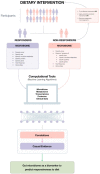Precision Nutrition and the Microbiome Part II: Potential Opportunities and Pathways to Commercialisation
- PMID: 31252674
- PMCID: PMC6683087
- DOI: 10.3390/nu11071468
Precision Nutrition and the Microbiome Part II: Potential Opportunities and Pathways to Commercialisation
Abstract
Modulation of the human gut microbiota through probiotics, prebiotics and dietary fibre are recognised strategies to improve health and prevent disease. Yet we are only beginning to understand the impact of these interventions on the gut microbiota and the physiological consequences for the human host, thus forging the way towards evidence-based scientific validation. However, in many studies a percentage of participants can be defined as 'non-responders' and scientists are beginning to unravel what differentiates these from 'responders;' and it is now clear that an individual's baseline microbiota can influence an individual's response. Thus, microbiome composition can potentially serve as a biomarker to predict responsiveness to interventions, diets and dietary components enabling greater opportunities for its use towards disease prevention and health promotion. In Part I of this two-part review, we reviewed the current state of the science in terms of the gut microbiota and the role of diet and dietary components in shaping it and subsequent consequences for human health. In Part II, we examine the efficacy of gut-microbiota modulating therapies at different life stages and their potential to aid in the management of undernutrition and overnutrition. Given the significance of an individual's gut microbiota, we investigate the feasibility of microbiome testing and we discuss guidelines for evaluating the scientific validity of evidence for providing personalised microbiome-based dietary advice. Overall, this review highlights the potential value of the microbiome to prevent disease and maintain or promote health and in doing so, paves the pathway towards commercialisation.
Keywords: genetics; gut; gut microbiome; immunity; metabolic disease; personalised nutrition; prebiotics; precision nutrition; probiotics.
Conflict of interest statement
The authors declare no conflict of interest.
Figures
Similar articles
-
Precision Nutrition and the Microbiome, Part I: Current State of the Science.Nutrients. 2019 Apr 24;11(4):923. doi: 10.3390/nu11040923. Nutrients. 2019. PMID: 31022973 Free PMC article. Review.
-
The effect of fiber and prebiotics on children's gastrointestinal disorders and microbiome.Expert Rev Gastroenterol Hepatol. 2017 Nov;11(11):1031-1045. doi: 10.1080/17474124.2017.1359539. Epub 2017 Aug 1. Expert Rev Gastroenterol Hepatol. 2017. PMID: 28737484 Review.
-
The role of the microbiome for human health: from basic science to clinical applications.Eur J Nutr. 2018 May;57(Suppl 1):1-14. doi: 10.1007/s00394-018-1703-4. Eur J Nutr. 2018. PMID: 29748817 Free PMC article.
-
Influence of habitual dietary fibre intake on the responsiveness of the gut microbiota to a prebiotic: protocol for a randomised, double-blind, placebo-controlled, cross-over, single-centre study.BMJ Open. 2016 Sep 2;6(9):e012504. doi: 10.1136/bmjopen-2016-012504. BMJ Open. 2016. PMID: 27591024 Free PMC article. Clinical Trial.
-
Interplay between gonadal hormones and postnatal overfeeding in defining sex-dependent differences in gut microbiota architecture.Aging (Albany NY). 2020 Oct 27;12(20):19979-20000. doi: 10.18632/aging.104140. Epub 2020 Oct 27. Aging (Albany NY). 2020. PMID: 33107844 Free PMC article.
Cited by
-
Effect of sequentially fed high protein, hydrolyzed protein, and high fiber diets on the fecal microbiota of healthy dogs: a cross-over study.Anim Microbiome. 2021 Jun 11;3(1):42. doi: 10.1186/s42523-021-00101-8. Anim Microbiome. 2021. PMID: 34116725 Free PMC article.
-
Integrated Multi-Omics Analysis Reveals Differential Effects of Fructo-Oligosaccharides (FOS) Supplementation on the Human Gut Ecosystem.Int J Mol Sci. 2022 Oct 3;23(19):11728. doi: 10.3390/ijms231911728. Int J Mol Sci. 2022. PMID: 36233028 Free PMC article.
-
The Use of Probiotic Therapy in Metabolic and Neurological Diseases.Front Nutr. 2022 May 3;9:887019. doi: 10.3389/fnut.2022.887019. eCollection 2022. Front Nutr. 2022. PMID: 35592636 Free PMC article. Review.
-
Heterogeneity of gut microbial responses in healthy household dogs transitioning from an extruded to a mildly cooked diet.PeerJ. 2021 Jun 30;9:e11648. doi: 10.7717/peerj.11648. eCollection 2021. PeerJ. 2021. PMID: 34249503 Free PMC article.
-
The hallmarks of dietary intervention-resilient gut microbiome.NPJ Biofilms Microbiomes. 2022 Oct 8;8(1):77. doi: 10.1038/s41522-022-00342-8. NPJ Biofilms Microbiomes. 2022. PMID: 36209276 Free PMC article.
References
-
- Institute of Medicine . Dietary Reference Intakes: Energy, Carbohydrates, Fiber, Fat, Fatty Acids, Cholesterol, Protein and Amino Acids. National Academies Press; Washington, DC, USA: 2005.
-
- Haro C., Montes-Borrego M., Rangel-Zúñiga O.A., Alcala-Diaz J.F., Gomez-Delgado F., Perez-Martinez P., Delgado-Lista J., Quintana-Navarro G.M., Tinahones F.J., Landa B.B., et al. Two healthy diets modulate gut microbial community improving insulin sensitivity in a human obese population. J. Clin. Endocrinol. Metab. 2016;101:233–242. doi: 10.1210/jc.2015-3351. - DOI - PubMed
-
- Haro C., García-Carpintero S., Rangel-Zúñiga O.A., Alcalá-Díaz J.F., Landa B.B., Clemente J.C., Pérez-Martínez P., López-Miranda J., Pérez-Jiménez F., Camargo A., et al. Consumption of two healthy dietary patterns restored microbiota dysbiosis in obese patients with metabolic dysfunction. Mol. Nutr. Food Res. 2017;61:1700300. doi: 10.1002/mnfr.201700300. - DOI - PubMed
Publication types
MeSH terms
Substances
LinkOut - more resources
Full Text Sources
Medical


